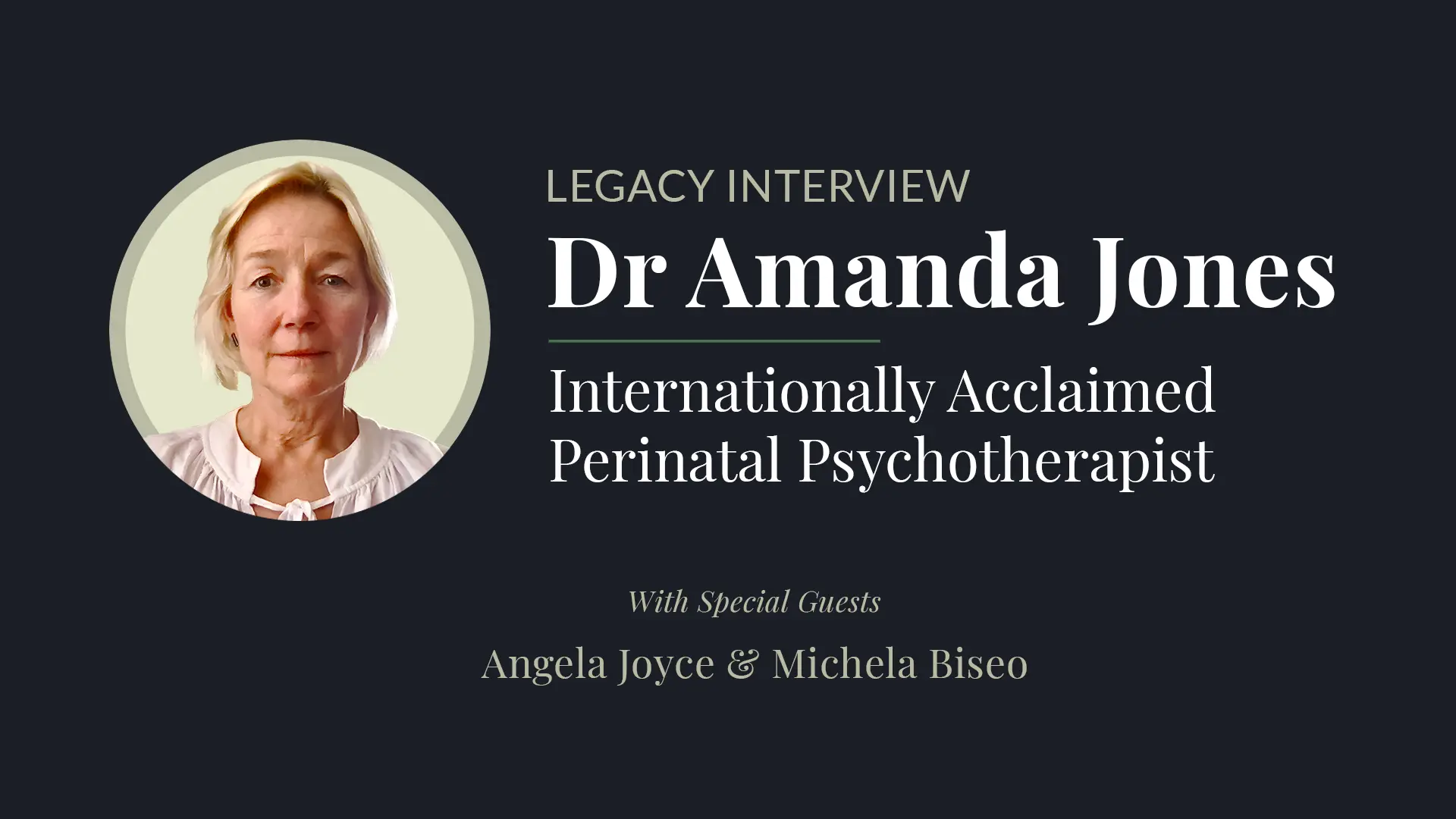– Watch this recording for £39 includes a 2 hour CEU/CPD certificate –
Dr Amanda Jones Legacy Interview
Acclaimed perinatal clinician Dr Amanda Jones discusses her pioneering work as a Consultant Perinatal Psychotherapist.
With Special Guests
Angela Joyce & Michela Biseo
“I really value Amanda’s combination of analytical and systemic understandings turned into ordinary human language, and (as I experienced it watching her work) love in action.”
Dr Amanda Jones
This Legacy Interview focused on sharing Dr Amanda Jones’ pioneering work as a Consultant Perinatal Psychotherapist.
The audience heard from some of the most respected and experienced clinicians working therapeutically with parents and infants about the latest thinking in perinatal mental health. It was an opportunity to hear about Amanda Jones’ journey as a leader in this important field.
Amanda Jones was known for her extraordinary therapeutic skills, her capacity to bear extreme difficulty in families and communicate what she knows about babies and their parents with depth, compassion and insight.
Amanda’s work had inspired people around the world who work with parents and babies, through several TV documentaries and series appearances, including the award-winning, ‘Help Me Love My Baby’.
Those who joined online were part of this insightful conversation with Amanda Jones.
Amanda said she enjoyed the challenge of considering the complexity of the family system and the intergenerational influences that can haunt the new parent/baby relationship. She was admired by others in the field for sharing her understanding of how psychodynamic parent infant therapy, which involves working with the parents and babies together can be a powerful therapeutic approach.
Amanda was a Consultant Perinatal Psychotherapist and as a leader of a multi-professional community Perinatal Parent Infant Mental Health Service, she was a strong advocate for the publicly funded provision of perinatal psychotherapeutic and perinatal medical (psychiatric) care.
She said parents and babies presented with a wide range of symptoms and suffering, often starting before or during the pregnancy, and so different psychological and medication treatments needed to be available.
The interview covered:
Navigating the Complexities of Parental Fears:
Risks and challenges involved in working with parents who feared their babies and who found it hard to feel loving. Amanda shared her interest in how parental projections could be intrusive for a baby and impede a baby’s development.
Defining ‘Good Enough’ Parenting:
They explored the concept of what constituted “good enough” parenting, how to think about parental care and the lived experiences and revived childhood feelings that could make parenting painful.
Parental Traumas and Dependency:
The reality of a baby’s dependency and relentless needs could reawaken parental traumas. Amanda discussed how she worked psychotherapeutically with parents with disturbing early histories and how she drew upon Alicia Lieberman and Arietta Slade’s insights into working with malignant and benevolent parental ghosts.
The Breakdown of the Parent’s ‘Care System’:
They delved into what happened when a parent’s internal ‘care system,’ as described by Jaak Panksepp, broke down, leading to a mis-attuned relationship with their baby.
Understanding Defensive Processes:
Amanda’s doctoral research focused on the defensive processes that could be triggered in everyone involved in perinatal care. They explored how these processes affected parents and professionals, particularly in the wake of a baby’s birth.
Transference Dynamics and Countertransference:
They explored the subtle interplay of transference dynamics between parents and their babies, as well as their own countertransference experiences in therapeutic settings.
Multi-Agency Collaboration:
They discussed the benefits of well-coordinated ‘shared thinking’ among various agencies, creating a metaphorical ‘safety net’ for both babies and their parents.
Safeguarding in High-Risk Situations:
The interview touched on the complexities of safeguarding and strategies for maintaining or regaining the capacity to think clearly when emotions ran high.
Balancing Documentation and Clinical Time:
They explored the tension between the statutory requirement to document and the need to spend quality time with the families they worked with.
The Power of New Life:
They discussed why the arrival of a baby could empower parents to confront their challenges with newfound courage and motivation.
The Vulnerability and Innocent Humour of Babies:
They reflected on the inherent vulnerability of babies and why this and their innocent humour could soften tension, awaken protective feelings and inspire everyone to keep on trying.
Guest Speakers
Angela Joyce
Training and Supervising Analyst of the British Psychoanalytical Society. She trained as a child analyst at the Anna Freud Centre where she helped to pioneer psychoanalytic work with infants and parents. She is past chair of the Winnicott Trust and Trustee of the Squiggle Foundation.
Michela Biseo
Child and Adolescent Psychoanalytic psychotherapist. Course Director for the Psychoanalytic Parent Infant Psychotherapy Training at the British Psychotherapy Foundation. Formerly Parent Infant Psychotherapy lead at the Anna Freud Centre, London.
Interviewer
Amanda is in conversation with Jane O’Rourke.
Jane O'Rourke, founder of MINDinMIND and a former award-winning BBC journalist now practising as a Child and Adolescent Psychotherapist, draws upon her combined expertise to create rich and thoughtful conversations with leading mental health clinicians. Her interviews weave together the personal and professional threads of her guests' journeys, capturing the experiences that have shaped their clinical work and thinking.
This recording was made November 15th 2023


